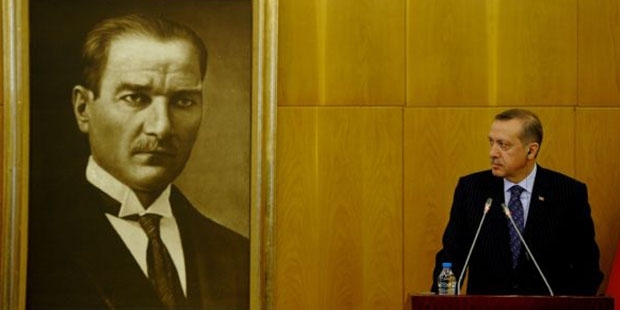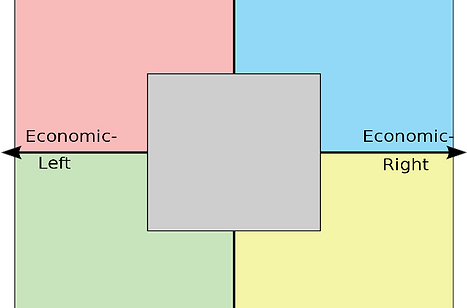
What is Kemalism?

How do we define Kemalism? Do we define it according to Atatürk’s ideas or do we define it according to the conception of Kemalism, adapted to the conditions of the present?
If we take Atatürk’s ideas as the basis, we can see that the core lies in objectivism (in Ayn Rand’s sense): The pursuit of excellence coupled with absolute pragmatism.
Atatürk pursued modernism not because he was in love with Europe, he seeked to be perfect as much as possible. “Kemal? He will never be content. Make him a pasha, he will want to be the vizier. Make him the vizier, he’ll want to be padishah. Make him a padishah, he will want to be God himself.”
It is the belief system of a talented individual, who was believed to be a “sahib-kıran” from the beginning. (meaning that the stars had destined him to be successful, making him a certain victor) We can understand this from the way people around him act: A constant adoration will undoubtedly make one adopt the belief others have for himself, and see a great destiny lay out before him. Imagine being intelligent, good-looking –and energetic to top it off. Couple this with independence from all beliefs. What are you left with? An amalgamation of feelings: Reason, love, yearning for power...
So it’s only natural that such a rare individual would seek to achieve greatness. We can also understand that he was affected by the theory of great men, it must also not be forgotten this was an age when Napoleon was still a God, albeit a beaten one.
Perhaps it will be a stretch, but could it also be said that a man without a father would be far more motivated by academic success? We leave it to the reader. A feeling of love and the substitution of a father figure by the teachers is something most of us experience, most of us see our fathers when we grow up anyhow; but let’s leave the father factor out of the question, it’s simply alarming when you read what you wrote and it sounds like something Freud would have written, we don’t want to go farther down this road.
Not only that, the people were already in search of a leader to follow. We know this from the condition of Turkish elites who were seeking someone to lead the way to revolution.
In its essence, we can say that Atatürk was an objectivist in the purest sense. Yearning for glory, forcing his muscles until their breaking point, just to be able to be on par with the figures of old. A modern Alexander, stomping everything in its path for its ambition, yet certainly a more successful one in Atatürk’s case.
What about Kemalism now? How is Kemalism seen through the lens of the laymen? Has it managed to be embraced by the masses, has it achieved intellectual depth?
Let’s see what Kemalism is suited for: Kemalism is an ideology fit for the transformation from a destroyed Ottoman Empire into the ideal modern republic. It is a continuation of the Empire in the sense that it is statist and supports authority, it is easy to see this property prevalent in Kemalist groups due to the sympathy with “TSK” and the coups they’ve initiated. In this sense, we can say that the army is still seen as the guardian of the republic as it was in Atatürk’s sense, and that modernization has failed since the republic still “needs protection” from the Kemalist viewpoint.
It is also a continuation of the empire in the sense that it has no distinctive treatment against imperialists: In fact, it can be seen that there have been times when Turkey has been ruled as a pawn of the US, reminiscent of the last periods of the empire. There has been no policy change against imperialists, even if there was a united attack to use Turkey’s resources, instead the goal of modernization led to reconciliation, and the “Anti-Imperialism” rhetoric wasn’t widely adopted as a policy.
The prevalence among the people has been increasing but the form of Kemalism is changing: The radical reform age is over. Its’ experience with the 28 Feb. Coup has led to the ideals of Kemalism to soften, and the 15th July Coup has closed the way for any ideas of coups, along with the mass expulsion of Kemalist officers from the army.
Despite the anti-army stance the government is taking and the divisive, victimizing rhetoric conservative Islamists adopt, Atatürk is adopted now more than ever as a country-wide figure, independent of political bounds.
This might change in the future, but today, Kemalism stands more integrated than ever with the general population, even if it has problems in finding correspondence with the intellectuals of the country who are Western educated (due to its' lack of depth) , it is still an ideal transformation period ideology that has been partially successful in its’ aim: Compared to its’ middle eastern counterparts, Turkey is still a better democracy despite all of its’ flaws. And if one day, we truly achieve modernization, Atatürk’s dream will be realized and this cult of personage will end, having realized its’ goal to make the people of Türkiye modern.






